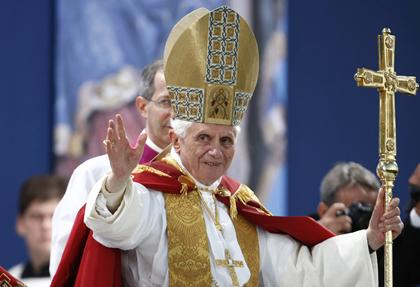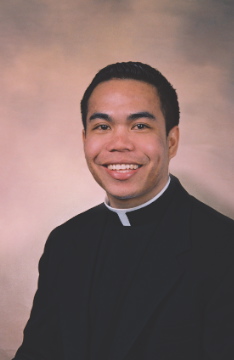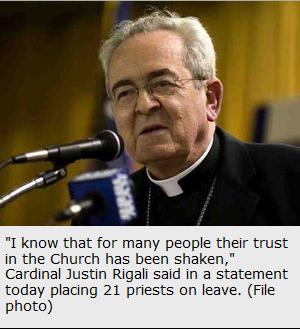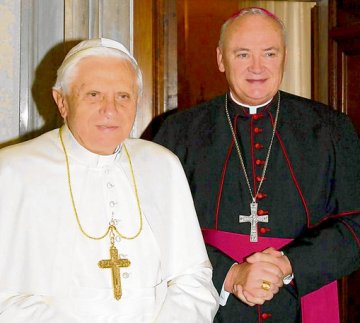In July 2011, Pope Benedict XVI had publicly expressed his shame over the evils of clerical child abuse during a visit to Australia, saying he was deeply sorry for the abuse of children by predatory priests, and now in September 2011, just two months after the Pontiff s eyebrow-raising statement, a former Aussie priest has been charged with 60 fresh offences relating to sex assaults on boys while he was working at a Sydney boarding school during the 1970s and 80s.
Interestingly, as an in-depth research conducted by The News International on this subject shows, this particular incident has surfaced hardly four months after the Vatican had issued guidelines for bishops worldwide on May 16, 2011, whereby they were directed to develop clear and coordinated procedures for dealing with the sexual abuse allegations by May 2012 and cooperate with the police in investigating allegations of sexual abuse by the clergy, though they were asked not make such reporting mandatory. (Reference: The New York Times edition of May 16, 2011).
This is what the Agence France-Presse (AFP) had reported on the latest Sydney incident: Police would not confirm the identity of the man, saying only that they had arrested a 65-year-old on Tuesday (September 13) in southwestern Sydney and that he has since been released on bail.
The Australian Broadcasting Corporation (ABC) said the suspect was a former Catholic priest who taught at the prestigious St Stanislaus College in Bathurst, west of Sydney, in the 1970s and 80s.
The college, according to the Paris-based AFP, had made headlines last month after former students came forward alleging they were molested during late-night prayer sessions.
The AFP had further stated in its afore-cited report: The former priest has already appeared in Bathurst Local Court in August on 33 other charges relating to sexual assault and gross acts of indecency on juveniles aged between 10 and 18. Reports said his court appearance prompted eight more alleged victims to make further allegations against the former cleric.
A latest September 15, 2011 report carried by the website of Swissinfo, a nine-language news and information platform produced by Switzerland s Public Broadcasting Corporation, the Catholic Church in this touristy Alpine nation has released new details of sexual abuse committed by priests and pastoral workers over the past 60 years.
Swissinfo states: Overall, 146 victims came forward to report abuse to Swiss dioceses in 2010 the first year in which detailed statistics have been presented by the church. The abuse was carried out by 125 priests and lay clergy, an expert commission of the Swiss Bishops Conference said on Thursday (September 15). The statistics broke down in more detail who the victims and perpetrators were and when the incidents had taken place since 1950. Abuse ranged from sexual harassment to rape. Most of the victims were teenage boys (25 per cent) and adult men (23 per cent). Another 20 per cent were children aged below 12 years. Half of the incidents were carried out by parish priests and 26 per cent by ordained men.
The official Swiss website had maintained, Most of the abuse happened between 1950 and 1980. Ten per cent of cases took place during the past decade. Confirmation of the abuse first came to light more than 16 months ago when the church announced cases reported from January-May 2010.
Although the Catholic sex abuse cases in nations like Canada, Ireland, the United States, the United Kingdom, Mexico, Belgium, France, and Germany etc have received significant media attention since the 1980s, after Father Donald Roemer of the Archdiocese of Los Angeles had pleaded guilty to felonious sexual abuse of a minor, most television channels and newspapers on the planet are now using the harshest possible language against the church and the clergy while reporting these incidents.
Had all been well at the Vatican and had the followers of Christianity been happy with their religious leaders, the CNN would not have aired these words in its September 16, 2010 report when the Pope was about to start his visit to Britain: There has already been widespread outcry over the estimated 12 million pounds ($18.7 million) British taxpayers are having to pay for the visit, though Christopher Patten, the Prime Minister s representative for the papal visit, has pointed out that one day of last year s G-20 summit in London cost 20 million pounds. Criticism has also focused on the armed police squads needed to protect a religious figurehead previously targeted by attackers. Along with anger about the Vatican s response to child and sexual abuse, there is criticism over the pope being granted a state visit, given the Catholic Church s attitudes towards gender equality and homosexuality.
The CNN had further reported on September 16, 2010: British people feel overwhelmingly that the Pope has not done enough to punish priests who abuse children. Three out of four British people and two out of three Catholics in the country say he should do more to punish the abusive clergy.
Till date dozens (if not hundreds) of the accused priests have been forced to resign in every nook and cranny of the globe. Many of these priests, whose crimes fell within statutes of limitation, are languishing in jail. Some have been defrocked. (Reference: The New York Times of August 31, 2006).
For example, Bernard Francis Law (born 1931), Cardinal and Archbishop of Boston had resigned after Church documents were revealed which suggested he had covered up sexual abuse committed by priests in his archdiocese. On December 13, 2002, Pope John Paul II had accepted Law s resignation as Archbishop and had posted him to the American Catholic church in Rome. (Reference: The New York Times of May 28, 2004).
Similarly, James Porter (1935-2005) was a Roman Catholic priest who was convicted of molesting 28 children. He had admitted sexually abusing at least 100 children of both sexes over a period of 30 years, starting in the 1960s. (References: The Boston Globe of April 13, 2004 and NBC News Channel report of February 11, 2005).
In 1995 Cardinal Hans Hermann Groer had to resign from his post as Archbishop of Vienna, Austria, over allegations of sexual abuse, although he remained a Cardinal. (Reference: The BBC report of April 14, 1998)
On April 7, 2010, it was revealed that a former bishop of the Norwegian Catholic Church, Georg Muller, had confessed to the police in early January 2010 that he had sexually abused an under-age boy 20 years earlier. Muller was made to step down as a bishop in July 2009. (Reference: Reuters report of April 7, 2010).
Various lawsuits against the custodians of the church have been filed in the United States and Ireland etc till date, whereby plaintiffs have alleged that some priests had sexually abused minors and that their superiors had conspired to conceal and otherwise abet their criminal misconduct.
Some had even accused the incumbent Pope for covering up complaints against his subordinate colleagues.
On 22 April 2010, a lawsuit was filed in the Milwaukee Federal Court by an anonymous plaintiff against the Vatican and Pope Benedict XVI for having covered up abuse cases to avoid scandal to the detriment of the concerned children.
In February 2011, two German lawyers initiated charges against Pope Benedict XVI at the International Criminal Court.
In 2004, the John Jay Report, commissioned by the US Conference of Catholic Bishops, had tabulated a total of 4,392 American priests against whom allegations of sexual abuse had been made. (References: The National Catholic Weekly edition of March 22, 2004 and the 2004 Catholic News Service Report titled John Jay Study Reveals Extent of Abuse Problem )
The Catholic News Service (CNS) is an American news agency covering the Roman Catholic Church since 1920 and is a leading source of news for Catholic print and broadcast media throughout the world.
A glance through the above-quoted references, particularly the 2004 Catholic News Service Report, shows that the 2004 John Jay Report was based on surveys completed by the Roman Catholic dioceses in the United States. It was based on a study of 10,667 allegations against 4,392 priests accused of engaging in sexual abuse of a minor between 1950 and 2002.
The John Jay report, whose printed version had caught the light of the day in June 2004, had stated that there were approximately 10,667 reported victims (younger than 18 years) of clergy sexual abuse during this period: Around 81 percent of these victims were male. While 22.6 per cent were age 10 or younger, 51 per cent were between the ages of 11 and 14, and 27 per cent were between the ages to 15 to 17 years.
Of these 4,392, approximately 56 per cent had one reported allegation against them; 27 per cent had two or three allegations against them; nearly 14 per cent had four to nine allegations against them; three percent (149 priests) had 10 or more allegations against them. These 149 priests were responsible for almost 3,000 victims, or 27 percent of the allegations. Almost 70 per cent of these priests were ordained before 1970.
In 2009, the former Archbishop of New York, Cardinal Edward Egan, had ignited heated discussions amongst his followers and Catholic Scholars when he said the church should consider ending celibacy rules and allow priests to marry.
The 76-year-old cardinal, who had presided over 2.5 million New York Catholics for at least eight years, had made these comments at the end of his stipulated tenure on March 10, 2009, but it was enough to get tongues wagging about the centuries-old church requirement.
According to the New York Times, the Vatican had signalled in the past that it was a closed issue, despite some indications of a discussion in the 1960s.
However, the last three popes, including Pope Benedict, have killed any discussion of lifting the celibacy rules, the newspaper had reported.
NBC television reported on March 23, 2009: Cardinal Egan s remarks come at the end of his tenure as New York Archbishop, raising questions about the motivation behind them. Was the conservative Cardinal giving a matter of fact response to a question of church law or was he really a reformer at heart? Regardless of his intent, the timing of these remarks has raised eyebrows. In 2003, 163 priests in the Milwaukee Archdiocese had petitioned the United States Conference of Catholic Bishops to consider the idea of lifting the celibacy rules because of the shortage of priests. Their petition was adamantly denied.
A thorough study of books like The struggle for Celibacy: the culture of Catholic seminary Life by Paul Stanosz and The Power of Abstinence by Kristine Napier would reveal that Celibacy (state of being unmarried) is viewed differently by the Catholic Church and the various Protestant communities
In the Latin Catholic Church, clerical celibacy is mandated for bishops and, as a general rule, for priests and for deacons who intend to become priests.
In Eastern Christianity, which comprises the Christian traditions and churches that developed in the Balkans, Eastern Europe, Asia Minor, the Middle East, Northeastern Africa, India and parts of the Far East, celibacy is mandatory for all bishops and for any priest who has been ordained while unmarried or who has lost his wife.
On the other hand, most Protestant churches are known to reject clerical celibacy.
It is common knowledge that in recent past, both Protestants and Catholics have agreed on numerous issues, yet clerical celibacy remains a dividing point between the followers of the two faiths in Christianity.
The Vatican, over the years, has allowed married priests to function by accepting them into the ranks of the Roman Catholic priesthood.
A sharp decline in the number of Catholic priests, the exodus of thousands of pastors who marry and leave the priesthood, coupled with sexual scandals of clerics and the lawsuits being filed against many of them for sexually abusing children in their care, has sparked international debates to eliminate the celibacy requirement for the priesthood and institute the ordination of married priests.
Full Article HERE!




